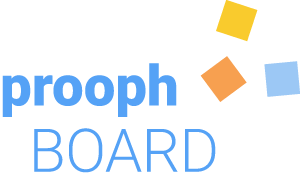Schema
Commands, Events and Information can have a schema defined in the Metadata.
A schema describes the data structure associated with one of these types. Schema definitions play a central role when developing prototypes with Cody Play and applications with prooph board Cody.
Command Schema
Users create, update, or delete information in a system by entering information in a form and triggering an action. Form fields are rendered based on a command schema and the server uses the command schema to validate incoming data.
Event Schema
All information is stored as a series of events in an event store. Each event has a name, a unique event id, a created timestamp, and information attached. The information is described by the schema.
Additionally, events have metadata which are system information in a key-value format.
Information Schema
Information schema is used to automatically render views for certain information and to ensure that information always has the desired structure.
JSON Schema
Cody Play/Engine uses JSON Schema Draft-07 for schema definition.
You can describe complex data structures along with rich validation rules in JSON Schema. Since Cody Play/Engine is based on JavaScript, JSON Schema is a perfect match. Open Source libraries like React JSON Schema Form provide powerful tools on top of JSON Schema.
Shorthand JSON Schema
A drawback of JSON Schema is its own schema 🙃. It’s a bit complicated to write JSON Schema, and it takes too much time. To get around the issue, prooph board supports a shortened and simplified syntax that is translated by Cody.
Shorthand JSON Schema covers the most common use cases. If you need advanced JSON Schema validation rules like IF-THEN-ELSE, you have to write the schema in normal JSON Schema format. Cody usually detects
a normal JSON Schema automatically. If not, you can set shorthand: false as an attribute in the metadata of the element.
In most cases the schema of a command, event, or information will be either an object or a list also known as array or a reference to another schema.
Shorthand Object
Shorthand objects are like JSON objects. You define a key-value-mapping where the key is the property name within the schema and the value is the JSON Schema validation definition of the
format: [type]|[keyword]:[value]|....
Optional Properties
Properties are required in the schema, unless they are suffixed with a question mark.
Defaults
If required properties are missing, but have a default defined, the default is set in the data structure.
Title
To set the title of an object use $title as a property name.
Shorthand Example
{
"$title": "Shortand Object Example",
"name": "string|minLength:3",
"age?": "integer|minimum:0|maximum:150",
"newsletter": "boolean|default:true"
}
JSON Schema Equivalent
{
"type": "object",
"title": "Shortand Object Example",
"properties": {
"name": {
"type": "string",
"minLength": 3
},
"age": {
"type": "integer",
"minimum": 0,
"maximum": 150
},
"newsletter": {
"type": "boolean",
"default": true
}
},
"required": [
"name",
"newsletter"
],
"additionalProperties": false
}
Additional Properties
As you can see in the example, additionalProperties is set to false when translating shorthand into JSON Schema.
A schema should be explicit to avoid surprise.
Nesting
Next to scalar types like string, number, integer, boolean, enum, a property can also be of type ojbect, array, or reference.
Nested Object
{
"address": {
"street": "string",
"city": "string"
}
}
Nested Array
Array with scalar item type:
{
"categories": "string[]"
}
or
{
"categories": {
"$items": "string"
}
}
JSON Schema Result
{
"type": "object",
"properties": {
"categories": {
"type": "array",
"items": {
"type": "string"
}
}
},
"required": ["categories"],
"additionalProperties": false
}
Array with object item type:
{
"addresses": {
"$items": {
"street": "string",
"city": "string"
}
}
}
JSON Schema Result
{
"type": "object",
"properties": {
"addresses": {
"type": "array",
"items": {
"type": "object",
"properties": {
"street": {
"type": "string"
},
"city": {
"type": "string"
}
},
"required": ["street", "city"],
"additionalProperties": false
}
}
},
"required": ["addresses"],
"additionalProperties": false
}
Shorthand Array
A top level array schema is defined by the special keyword $items with its value being the schema definition of the array items.
Shorthand Example
{
"$items": "string"
}
JSON Schema Equivalent
{
"type": "array",
"items": {"type": "string"}
}
Shorthand Reference
A schema (or a property of a schema) can reference another schema. So let’s say we’ved defined an Address schema in the default namespace App:
{
"$title": "Address",
"street": "string",
"city": "string",
"zipCode": "string"
}
JSON Schema Equivalent
{
"title": "Address",
"type": "object",
"properties": {
"street": {"type": "string"},
"city": {"type": "string"},
"zipCode": {"type": "string"}
},
"required": ["street", "city", "zipCode"],
"additionalProperties": false,
"$id": "/definitions/app/address"
}
Please Note: The $id property is automatically added by Cody while translating Shorthand into JSON Schema using the namespace and name of the information card.
Now we want to define an AddressList schema and reference the already defined Address schema:
{
"$items": {
"$ref": "/App/Address"
}
}
References are indicated by the special keyword $ref and point to another schema by using namespace + information name.
JSON Schema Equivalent
{
"type": "array",
"items": {
"$ref": "#/definitions/app/address"
},
"$id": "/definitions/app/address-list"
}
The entire schema registration and definition translation is done by Cody in the background. You don’t need to worry about that when working with Cody Play/Engine.
And prooph board suggests references of known information schema when writing a schema. Suggestions are shown automatically, but you can also trigger them by pressing Ctrl+Space.
